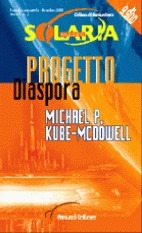What do you think?
Rate this book


496 pages, Paperback
First published January 1, 1990
Michael Paul Kube-McDowell's earliest science fiction stories began appearing in magazines such as Amazing, Asimov's, and Analog in 1979. His 1985 debut novel Emprise, the first volume of the Trigon Disunity future history, was nominated for the Philip K. Dick Award. The Quiet Pools, published as a Bantam hardcover in 1990, was a Hugo Award nominee.
In addition to his solo novels, Kube-McDowell has collaborated with Sir Arthur C. Clarke (The Trigger) and Isaac Asimov (for the YA series Robot City. He also wrote the popular Black Fleet Crisis trilogy for the Star Wars Expanded Universe; all three volumes were New York Times bestsellers.
A former middle school science teacher, Kube-McDowell has written about science and technology for a variety of periodicals, on topics ranging from gnotobiology to ultralights to spaceflight. He covered the launch of STS-4 for The South Bend Tribune.
Kube-McDowell has attended more than 80 SF fan conventions, and met his wife Gwen (then an artist) in a con huckster room. They both were later members of the Pegasus Award-winning electric filk ensemble The Black Book Band, which performed at cons in the Midwest in the 1990s and released the live album First Contact (Dodeka Records).